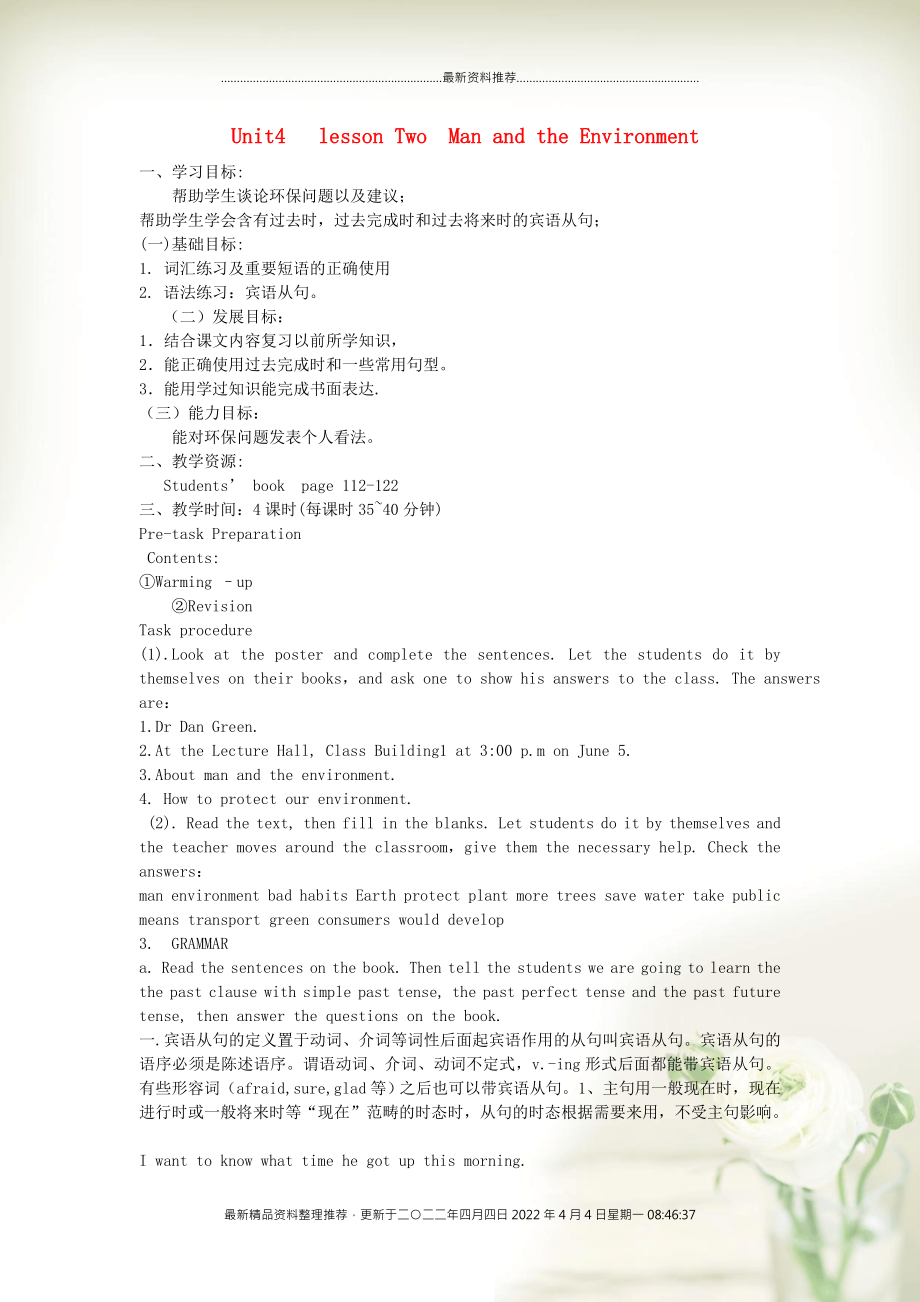《【金識(shí)源】八年級(jí)英語(yǔ)下冊(cè) Unit 4 Lesson 2 Man and the Environment教學(xué)設(shè)計(jì)1 上海新世紀(jì)版》由會(huì)員分享�,可在線(xiàn)閱讀�,更多相關(guān)《【金識(shí)源】八年級(jí)英語(yǔ)下冊(cè) Unit 4 Lesson 2 Man and the Environment教學(xué)設(shè)計(jì)1 上海新世紀(jì)版(3頁(yè)珍藏版)》請(qǐng)?jiān)谘b配圖網(wǎng)上搜索。
1�����、……………………………………………………………最新資料推薦…………………………………………………
Unit4 lesson Two Man and the Environment
一����、學(xué)習(xí)目標(biāo):
幫助學(xué)生談?wù)摥h(huán)保問(wèn)題以及建議;
幫助學(xué)生學(xué)會(huì)含有過(guò)去時(shí)���,過(guò)去完成時(shí)和過(guò)去將來(lái)時(shí)的賓語(yǔ)從句�����;
(一)基礎(chǔ)目標(biāo):
1. 詞匯練習(xí)及重要短語(yǔ)的正確使用
2. 語(yǔ)法練習(xí):賓語(yǔ)從句��。
(二)發(fā)展目標(biāo):
1.結(jié)合課文內(nèi)容復(fù)習(xí)以前所學(xué)知識(shí)����,
2.能正確使用過(guò)去完成時(shí)和一些常用句型。
3.能用學(xué)過(guò)知識(shí)能完成書(shū)面表達(dá).
(三)能力目標(biāo):
能對(duì)環(huán)保問(wèn)題發(fā)表個(gè)人看法
2�����、�����。
二�����、教學(xué)資源:
Students’ book page 112-122
三�、教學(xué)時(shí)間:4課時(shí)(每課時(shí)35~40分鐘)
Pre-task Preparation
Contents:
①Warming –up
②Revision
Task procedure
(1).Look at the poster and complete the sentences. Let the students do it by themselves on their books���,and ask one to show his answers to the class. The
3�、answers are:
1.Dr Dan Green.
2.At the Lecture Hall, Class Building1 at 3:00 p.m on June 5.
3.About man and the environment.
4. How to protect our environment.
(2). Read the text, then fill in the blanks. Let students do it by themselves and the teacher moves around the classroom����,give them the
4、necessary help. Check the answers:
man environment bad habits Earth protect plant more trees save water take public means transport green consumers would develop
3. GRAMMAR
a. Read the sentences on the book. Then tell the students we are going to learn the the past clause with simple past tense,
5��、 the past perfect tense and the past future tense, then answer the questions on the book.
一.賓語(yǔ)從句的定義置于動(dòng)詞�、介詞等詞性后面起賓語(yǔ)作用的從句叫賓語(yǔ)從句�����。賓語(yǔ)從句的語(yǔ)序必須是陳述語(yǔ)序��。謂語(yǔ)動(dòng)詞��、介詞、動(dòng)詞不定式�����,v.-ing形式后面都能帶賓語(yǔ)從句�����。有些形容詞(afraid,sure,glad等)之后也可以帶賓語(yǔ)從句�。1、主句用一般現(xiàn)在時(shí)���,現(xiàn)在進(jìn)行時(shí)或一般將來(lái)時(shí)等“現(xiàn)在”范疇的時(shí)態(tài)時(shí)���,從句的時(shí)態(tài)根據(jù)需要來(lái)用,不受主句影響�����。
I want to know what time he got up
6、this morning.
?? He will tell us that he has been able to look after himself.
?? They are saying that they really like this city.
?
2��、主句用過(guò)去時(shí)�����,從句用與過(guò)去相關(guān)的時(shí)態(tài)����。
Kate said there was a box under the desk.
They asked what he was doing then.
She asked whether I had seen her before.
?
3、從句說(shuō)明的是一般真理����、客觀(guān)
7、事實(shí)���、自然現(xiàn)象�、名言時(shí)�����,仍用現(xiàn)在時(shí)��。
?
Dad told us that it is better to do than to say.
He told the boy that three and three is six.
He told me the earth moves around the sun.
?
4、從句中有具體時(shí)間狀語(yǔ)����,即使從句動(dòng)作發(fā)生在主句動(dòng)作前,仍用一般過(guò)去時(shí)���。
?
The teacher told me she was born in 1960.
?
【Exercise 1】
1. These flowers are from Guangdo
8����、ng. He said.
? He said _______ these flowers _______ from Guangdong.
2. Light(光) goes faster than sound. My teacher told me.
? My teacher told me _____ light _______ faster than sound.
3. There will be a meeting in five days. Jack didn’t know.
? Jack didn’t know _____ there _____? ____ a meetin
9�、g in five days.
4. Can they speak French? I want to know.
? I want to know ______? _______? _______? _______ French.
5. Are the children playing games? Tell me.
? Tell me ______ the children ______? ______ games.
6. What's his name? I asked him.
? I asked him what _____?? _____?? _____.
7. Ho
10����、w many people can you see in the picture? Who knows?
Who knows ______? _____? _____ ____ _____ ______ in the picture?
8. Where did she put her car? Do you know?
? Do you know _____? _____? ____ her car?
9. What does he often talk about? The girl wondered.
The girl wondered _____? _____ often __
11、______ about.
10. Who knocked at the door so loudly? I don’t know.
? I don’ t know ______? _______ at the door so loudly.
11. Does he still live in that street? I don't know.
? I don't know ______ he still _______ in that street.
12. When does the train arrive? Please tell me.
? Please tell me
12��、 ________? _________? ________? _________.
13. Do they want fried chicken? He asked the boys.
? He asked the boys _______ they ______ fried chicken.
b. Do some exercises and then check the answers in class, find what the difficulties are.
4. Reading
Read the passage and choose the best answ
13��、ers.
Tell the students to read the passage carefully����,and think it over,then complete it. First ask the students talk about his or her answers with classmates.
5. Listening
Listen and choose the best response to what you hear. First listen only, then do it the second time.
四�����、Homework:
14、write a composition about the environmental problems.
五�、板書(shū)設(shè)計(jì):
Unit4 lesson Two Man and the Environment
man environment bad habits Earth protect plant more trees save water take public means transport green consumers would develop
賓語(yǔ)從句的時(shí)態(tài)主句是一般現(xiàn)在時(shí),從句根據(jù)實(shí)際情況使用任何時(shí)態(tài)�����。
例句:The headmaster hopes everything goes well.
主句是過(guò)去時(shí)態(tài)����,從句須用過(guò)去時(shí)態(tài)的某種形式。
例句:She was sorry that she hadn’t finished her work on time.
當(dāng)賓語(yǔ)從句表示的是一個(gè)客觀(guān)真理或者事實(shí)時(shí)����,即使主句是過(guò)去時(shí),從句也用一般現(xiàn)在時(shí)態(tài)�����。
六���、教學(xué)反思:
通過(guò)學(xué)生們的完成習(xí)題情況����,可以看出對(duì)本課知識(shí)掌握的較好。
最新精品資料整理推薦���,更新于二〇二二年四月四日2022年4月4日星期一08:46:37
 【金識(shí)源】八年級(jí)英語(yǔ)下冊(cè) Unit 4 Lesson 2 Man and the Environment教學(xué)設(shè)計(jì)1 上海新世紀(jì)版
【金識(shí)源】八年級(jí)英語(yǔ)下冊(cè) Unit 4 Lesson 2 Man and the Environment教學(xué)設(shè)計(jì)1 上海新世紀(jì)版

